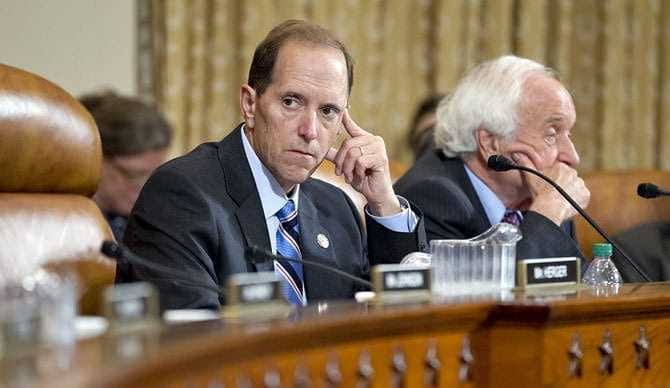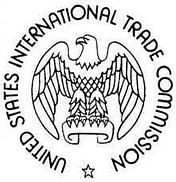
U.S. House Ways and Means Committee Chairman Dave Camp
The U.S. House Ways and Means Committee released a report today on the competitiveness of the U.S. olive oil industry exactly one year after requesting an investigation by the United States International Trade Commission (USITC).
Unenforced standards lead to mislabeled products, weakening the competitiveness of quality producers
Olive oil producers, importers and marketers around the world are sifting through the 282-page document to try to gauge how the findings might affect their interests.
House Ways and Means Committee Chairman Rep. Dave Camp (R‑Michigan) asked the USITC for an overview of U.S. and global olive oil production activity, information on tarriff treatments, grading practices, and an assessment of the competitive strengths and weaknesses of the United States versus major producing countries. “A significant problem is the lack of information about the commercial olive oil industry of certain major supplier countries to the US. market,” Camp said.
The USITC launched its investigation with a hearing in Washington last December where American producers, importers and lipid chemists testified on matters ranging from European subsidies and tariffs to olive oil quality and fraud.
“Substantial European government subsidies, ineffectual quality standards, combined with rampant fraud and mislabeling have prevented the U.S. olive oil industry from realizing its potential,” said California Olive Ranch vice president Adam Englehart. North American Olive Oil Association (NAOOA) Executive Vice President Eryn Balch, testifying on behalf of major importers, called for enforcement of existing international standards for olive oil grades.
Since that hearing, USITC investigators have met with more than 200 growers, millers, bottlers, traders, government officials, and other industry experts throughout all of the countries highlighted in the report. They delivered their findings to the Ways and Means Committee on August 12, and today the report was released to the public.
Although the Commission makes no recommendations on policy or other matters in its general factfinding reports, such §332 investigations are often followed by U.S. trade actions that can have an impact, including limiting imports.
“A §332 investigation can lead to U.S. objections to believed foreign trade barriers or unfair trade practices (such as subsidies), followed sometimes with formal complaints filed at the World Trade Organization, or USTR §301 actions against the objected to foreign practices,” wrote international trade lawyer Peter Koenig for Olive Oil Times. “Section 332 investigations are not idly requested. They are requested for a purpose.”
 What the USITC investigators found:
What the USITC investigators found:
- Although U.S. production of olive oil remains small on a global scale, the United States is among the nontraditional producing countries that are responding to higher global demand, and output has risen quickly in recent years. But recent investment in U.S. olive oil production has slowed in reaction to lower global prices following a succession of bumper crops in Spain, and because of concern among U.S. producers that their competitive position in the domestic market is threatened by a lack of regulatory oversight.
- Current international standards for extra virgin olive oil allow a wide range of oil qualities to be marketed as extra virgin. In addition, the standards are widely unenforced. Broad and unforced standards lead to adulterated and mislabeled products, weakening the competitiveness of high-quality producers, such as those in the United States, who try to differentiate their product based on quality. EU government support programs contribute to high overall supplies of olive oil, reducing global olive oil prices. Many small growers in the EU rely on costly traditional methods of production and have costs that are at or above global prices. Because some of these producers would likely cease production in the absence of income support from the EU, the CAP has the indirect effect of increasing total global olive oil supply and reducing prices.
- Olive oil marketers aim to differentiate their products by brand and level of quality, but price remains one of the most important factors in U.S. consumer purchasing decisions. This is due, in part, to a lack of consumer awareness of quality differences. U.S. consumers are generally unfamiliar with the range of olive oil grades and uses.
- Broadly, two types of business models are employed to attract customers in the U.S. retail market: cost leadership or product differentiation. Firms that focus on cost leadership, such as large bottlers that blend oil produced in multiple countries, attract consumers mostly on price. On the other hand, smaller, vertically integrated firms produce a higher quality, more flavorful oil and try to differentiate their product based on quality.
- The U.S. olive oil industry produces high-quality extra virgin olive oil, mostly through highly mechanized and intensively managed groves. U.S. farm level production costs for olive oil are competitive, but lack of scale and high capital costs result in higher prices in the retail market.
“We applaud the USITC for producing this insightful work and commend Chairman Dave Camp for requesting it,” said Kimberly Houlding, executive director of the American Olive Oil Producers Association. “We believe consumers deserve to understand the quality of the oil they are buying and trust its authenticity and producers deserve fair access to consumers in markets both here and abroad.”
“Given the USITC documentation of the European subsidies, high tariffs and significant adulteration and mislabeling, we are anxious to work with U.S. officials to resolve these barriers that clearly impede growth of the U.S. olive oil industry,” said Houlding.
Jason Shaw, president of Georgia Olive Farms said, “All we ask is that our oils be allowed to compete fairly on quality, taste and value on store shelves for consumers in both the U.S. and other countries.”


